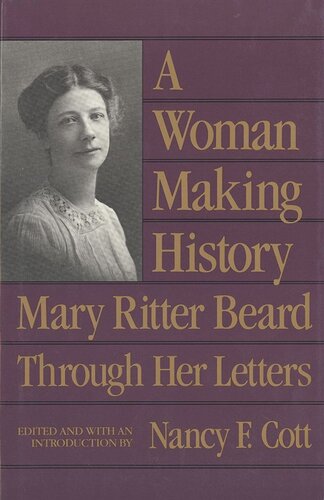

Most ebook files are in PDF format, so you can easily read them using various software such as Foxit Reader or directly on the Google Chrome browser.
Some ebook files are released by publishers in other formats such as .awz, .mobi, .epub, .fb2, etc. You may need to install specific software to read these formats on mobile/PC, such as Calibre.
Please read the tutorial at this link: https://ebookbell.com/faq
We offer FREE conversion to the popular formats you request; however, this may take some time. Therefore, right after payment, please email us, and we will try to provide the service as quickly as possible.
For some exceptional file formats or broken links (if any), please refrain from opening any disputes. Instead, email us first, and we will try to assist within a maximum of 6 hours.
EbookBell Team

4.8
34 reviewsHistorian, social reformer, and women’s suffrage campaigner, Mary Ritter Beard (1876-1958) was one of the most prominent intellectuals of her day. Coauthor with her husband, Charles A. Beard, of The Rise of American Civilization and other renowned works in U.S. history, she also founded the modern field of women’s history. This collection of her letters, edited and introduced by Nancy F. Cott, offers in effect an intellectual biography—better documented and more vivid than any previous book about her.
In her supremely ironic act, Mary beard, who led the World enter for Women’s Archives was instructed in setting up the two largest collections of American women’s history (the Schlesinger Library at Radcliffe College and the Sophia Smith Collection at Smith College), destroyed most of her own personal papers. Cott nevertheless manage to find hundreds of Beard’s letters spanning the years from 1911 to 1955 by searching in more than thirty archives of Beard’s correspondents. One hundred forty-one letters are printed here, interspersed with Cott’s commentary and introduced by a thoughtful essay that analyzes Beard’s life work, her companionship with her husband, and the evolution of her views on women’s history.
The letters, sharply opinionated on public matters, persons, and books, reveal a free-standing thinker whose self-confessed “obsession with women” led her both in and out of step with feminists of her generation. Illuminating many facets of Beard’s partnership with her husband, they present just as forcefully her own dramatic passion for advancing knowledge and bringing about social change throughout the recovery of women’s history. Her maverick voice is instructive and revelatory today. A uniquely vital portrait, the book gives Mary Ritter Beard the recognition that is her due.